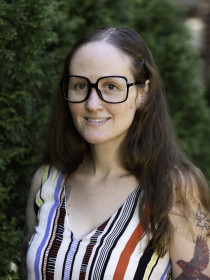
Christa Charbonneau Kuntzelman
Connect with Christa
About Christa
Kuntzelman's doctoral research examines variation in political knowledge of rights, responsibilities, restrictions, and governance actors and processes among urban refugees in Uganda. Kuntzelman's research overall, intersects with studies of refugees as protection and service providers, the roles of refugee-led organizations that serve their fellow displaced, and African politics. Kuntzelman has extensive experience beyond research, as an advocate to unaccompanied minors seeking asylum, as well as work for family reconnection and reunification with the Red Cross. Kuntzelman also has extensive mentorship experience to undergraduate students.
Contributions
Publications
Analyzes Ugandan newspapers to demonstrate variation in the tactics how refugees express their protection and provision grievances (e.g., protest, letter-writing, or illegal actions), and variation in the governmental or humanitarian actors to whom refugees make their claims. Findings support that refugees sometimes fail to obtain vital rights and protection assistance in Uganda because they lack knowledge on their rights and on who upholds their rights.
Discusses humanitarian responses to international migration—including to forced migration where individuals have no choice but to leave one country for protection in another—are often able to respond only to migrants’ immediate protection and provision needs. Mentions through their efforts to restore communication between internationally separated family members, the global Red Cross and Red Crescent Movement supplements these humanitarian efforts by responding to migrants’ emotional and psychological needs.
Argues that everyone needs political knowledge of their rights, restrictions, responsibilities, and of who decides and upholds these. Finds through survey and archival review, that refugees with higher political knowledge are more resilient to access available employment, educational, and other opportunities while those with lower knowledge are likelier to fall victim to exploitation, such as costly schemes that falsely promise resettlement.
Argues that even though refugees have been displaced because of politics, displaced persons—including refugees, internally displaced persons (IDPs), and diasporic community members—can meaningfully contribute to peace building in their home countries.
Demonstrates the value of these refugee-led efforts and argues for more systematic inclusion of refugees into global policy- and decision-making.